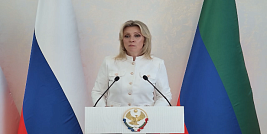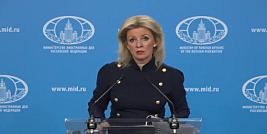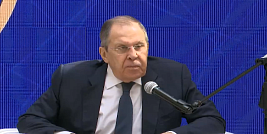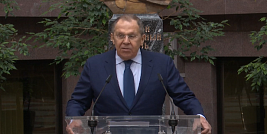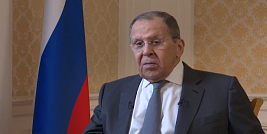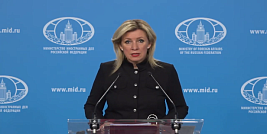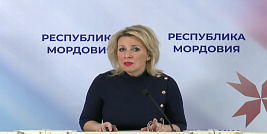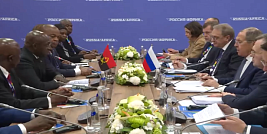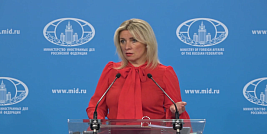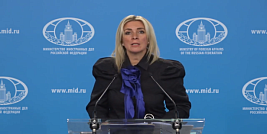Foreign Minister Sergey Lavrov’s remarks and answers to media questions following President Vladimir Putin’s meeting with senior Foreign Ministry officials, Moscow, June 14, 2024
You have all listened to President Vladimir Putin’s remarks and the thorough review he provided on global, European and Eurasian security. Once again, President Vladimir Putin offered a detailed account demonstrating consistency in our Ukraine policy. So far, the West has not been receptive to this policy, not even once. Instead, it decided to use Ukraine as a tool for suppressing the Russian Federation, including by relying on military, economic and other methods.
Speaking on security matter, Vladimir Putin said that the Euro-Atlantic model has become a thing of the past. In this context, I would like to note that after the Soviet Union ceased to exist, and also in its later years, we were ready to cooperate, and the President of Russia also reminded us about it today, but only on equal terms and subject to maintaining a balance of interests. But the West decided that it won the Cold War and opted for securing its dominant positions across the board. For the first two decades we were basically part of the Euro-Atlantic architecture. In late 1990s, we formed the Russia-NATO Council. There was also a developed and extensive mechanism for working with the European Union: two summits per year, four common spaces, and a plethora of joint projects. It goes without saying that the OSCE, despite its name, also resulted from the Euro-Atlantic security dimension. But the policy by the United States to dominate everything and everyone and force everyone to abide by its will has made ineffective and devalued all these and other structures belonging, in one way or another, to the Euro-Atlantic framework.
Europe was among the victims of this policy. It lost its independence. In this sense, the idea of achieving security within the Euro-Atlantic context is no longer relevant for us. Just as President Vladimir Putin has said, our goal is to ensure Eurasian security. This makes sense. After all, we share the same continent and there are no oceans or English channels, or what have you, separating us.
There are quite a few integration associations on this continent already, and many of them deal with security matters. I am referring to the CSTO, the CIS and the SCO, as well as the EAEU and ASEAN with their focus on economic matters. They all operate within a single Eurasian space. During the first Russia-ASEAN Summit in Sochi back in 2015, President Vladimir Putin suggested exploring opportunities for coordinating and harmonising the integration processes across our continent for building the Greater Eurasian Partnership.
Apart from the organisations I have just mentioned, there are other integration structures on this continent, including in South Asia. The Persian Gulf has its Gulf Cooperation Council – the GCC. The Arab League also covers a substantial part of the Eurasian continent.
All this operates as one Greater Eurasian Partnership, just as the President of Russia said today. It can build a tangible socioeconomic foundation for the security framework we want for us, as long as it focuses on economic, transport and financial chains which are immune to the dictate imposed by the United States and its satellites. President Vladimir Putin put a special emphasis on the fact that this framework is open to all countries and organisations on the Eurasian continent without exception. Of course, this includes leaving the door open for Europe and the European countries which finally realise that they must build their future by focusing on the core interests of their people instead of just serving the interests of the United States and the US-led collective West.
In order to achieve these objectives, we must start by specifying what the Greater Eurasian Partnership concept and Eurasian security in all its dimensions stand for, including in military and political terms, economic and humanitarian affairs. As you know, we already have a series of Eurasian and even global events on our continent as a response to the attempts by the West to monopolise international sports and culture. I am referring to the Games of the Future we had, as well as the BRICS Games which have opened in Kazan, and the upcoming World Friendship Games, the International Cultural Forum, and the Intervision International Song Contest.
President of Kazakhstan Kassym-Jomart Tokayev initiated the creation of an International Organisation for the Russian Language. It will also serve as a major unifying element on the Eurasian continent where so many people, countries and nations speak and love the Russian language, and have an affinity for the Russian culture.
As for Ukraine, I have nothing to add on this topic. President of Russia Vladimir Putin listed the gestures of good will (to an extent they can be viewed as partial concessions) we undertook after the Maidan uprisings and the February 2014 government coup. Russia took so many steps in its constructive approach and demonstrated its commitment to preserving the Ukrainian state and remaining on friendly terms with it, only to be rejected in a consistent, firm and categorical manner.
Today, we reached a point when President of Russia Vladimir Putin once again asks others to heed our message. After all, over the past ten years, whenever the West turned down our proposals, nothing good came from this.
Question: President Vladimir Putin has set forth concrete conditions for launching peace talks with Ukraine. What specifically does the Foreign Ministry intend to do on its behalf to fulfil these provisions? Can we expect any contacts, especially in view of the situation regarding the legitimacy of the current Ukrainian authorities?
Sergey Lavrov: President Vladimir Putin covered the legitimacy issue in all its aspects. This was not the first time he mentioned this topic. Everything is abundantly clear in this regard. In his previous statements on this topic, the President said that Ukraine’s political and legal framework must define the final decisions. Any legal experts will come to the same conclusion after reading the Ukrainian constitution. If everyone once again turnes a blind eye to this signal, this would be yet another disappointing experience for us regarding our Western partners.
As for the Foreign Ministry’s role, we have no plans to run after anyone begging for something. Our ambassadors to the corresponding capitals will share President of Russia Vladimir Putin’s remarks and will offer additional explanations on their substance, including how it all got to this point. We will wait for a response. I have no doubt that the countries of the Global Majority understand all this. We have discussed the Ukraine topic with many of their representatives, including on June 11, 2024, in Nizhny Novgorod – I am referring to the participants in the BRICS Plus Foreign Ministers’ Meeting. They understand this very well.
As for the decision makers, they are currently in Italy, at the Group of Seven meeting. Vladimir Zelensky is somewhere nearby too. There will also be this questionable event in Switzerland tomorrow or maybe the day after, even if it has yet to be seen who will be attending it. I do hope that President Vladimir Putin’s remarks give them something to discuss.
Question: As you know, there will be an election in France in a few weeks. Can you tell us how you are monitoring the situation? What do you expect? What are you hoping for?
Sergey Lavrov: We certainly follow the political developments in countries where we have ambassadors and where we have embassies. They report about the domestic and international agenda of a given country, just like French, American and other ambassadors report about what is going on in Russia.
As for expectations, as far as I am concerned, for a long time already I do not expect anything from any place, especially from the leading European countries. I am sorry for them – that is what I can say, because they, as President of Russia Vladimir Putin confirmed today in his speech, are not independent. President of France Emmanuel Macron has repeatedly flagged the slogan of strategic autonomy. Take a look at what is happening in real life.
Question: The peace proposals that the President set out are based on conditions that Ukraine must follow. But shouldn’t it be Russia that makes the first move here and pulls back its troops?
Sergey Lavrov: Have you listened to the President? Twice, in the middle of his speech and in the end, he said: I want to repeat the sequence. The speech is going to be circulated, and the sequence is there.
If you read it for the third time, you would understand that Russia has been doing everything possible on the basis of deals reached and then broken by Boris Johnson and a number of other politicians.
Question: If, say, Ukraine does meet these conditions, what’s to say Russia stops there? Why should the West trust you?
Sergey Lavrov: You know, we do not ask the West to trust us. Trust is not something illustrating the Western positions, the Western action. Today, there were many examples – I do not want to recite all these failures to deliver on promises, these failures to deliver on legal obligations.
Frankly, I do not care whether the West trusts us or not. The West must understand the real situation. They do not understand anything, except realpolitik. Let them go to the people. You are democracies, right? Ask the people what the West should do in response to Putin’s proposals.
Question: If we do not need the West to believe us, but we are still making these proposals. Say they do agree and we withdraw our troops…
Sergey Lavrov: Let me interrupt you. I am not going to speculate on this issue. I think that you do understand that making these “what if” statements does not make any sense right now. We have already been there.
Question: But can we expect that they would not fool us yet again?
Sergey Lavrov: Of course, we cannot do that. This is why all this was framed this way. We are ready to work on a solution based on the conditions set forth by the President of Russia. We will stop combat action as soon as we understand that these conditions are being implemented. We will cease hostilities the very moment this happens, just as he said.
Question: Do we have any plans to send this initiative to the United Nations? What channels will President Vladimir Putin use to communicate these proposals to Ukraine, if he decides to do it?
Sergey Lavrov: I think that everyone is already reading these proposals and know them. The President presented his remarks, which does not require us to release them as a document or an official proposal or an initiative.
This is a technicality. I do not care how this information gets circulated. Everyone knows about it already. We will see how they respond to it.
Question: If I am not mistaken, the last time you talked with the top US diplomat was in January 2022. At the time, as you have said, the US ignored all our proposals. The special military operation has been going on for two years now. Considering where we are today, does the United States feel any need or desire to have any official contacts with the Russian Foreign Ministry?
Sergey Lavrov: I do not know what they want, and even less so in terms of what the United States needs, no matter how you look at it.
Question: Don’t you think that proposals on launching peace talks are more akin to an ultimatum requiring capitulation?
Sergey Lavrov: I think that this would be a wrong way to frame this issue.
President Vladimir Putin made a special point before ending his speech on presenting the whole picture. We supported the document preserving Ukraine’s territorial integrity within its 1991 borders. It happened on February 21, 2014. Europe as a whole guaranteed that the agreement between President of Ukraine Viktor Yanukovich and the opposition would be carried out. Barack Obama’s former ambassador called Vladimir Putin asking not to interfere with this agreement. But after we threw our weight behind it, a government coup happened the very next morning. Had it not happened, Ukraine would have still existed within its 1991 borders.
After that, they designated regions which refused to recognise the outcomes of this bloody anti-constitutional coup as terrorists. This led to a year-long war. Responding to requests coming from all sides (the Germans and the French), we facilitated the signing of the Minsk agreements. They provided for preserving Ukraine’s territorial integrity, minus Crimea. I can keep talking forever on this topic.
President Vladimir Putin articulated this matter as clearly as possible. I believe that you have a critical mind, which means that you can well decide whether it was an ultimatum. If you do present this as an ultimatum in your reporting, please, do not fail to mention how it all got there. You often mention cancel culture in your reports by drawing conclusions without mentioning the primary causes.
